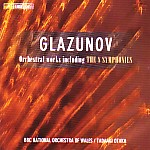My colleague Victor Carr Jr already has commented favorably on most of the individual releases in this fine cycle of Glazunov symphonies (all except Nos. 4 and 8), and the fact that the entire set is available on five discs for the price of two makes it a very attractive proposition. Tadaaki Otaka and the BBC National Orchestra of Wales don’t generate quite the same level of excitement as does Järvi on Orfeo, with his extremely swift tempos and light textures, but that cycle remains at full price on single discs, and Otaka’s interpretations can hardly be accused of excessive tameness or heaviness. They are more traditional, more “Tchaikovsky-like”, if you will, and remain perfectly legitimate and enjoyable embodiments of Glazunov’s essentially lyrical inspiration. Serebrier’s ongoing cycle with the Scottish National Orchestra on Warner Classics also is shaping up to be a contender, but don’t count on it being readily or generally available for long. The bottom line is simple: if you want these extremely well-made and attractive works and don’t want to shell out a fortune to get them all, this is way to go–at least for now. [5/7/2007]
































